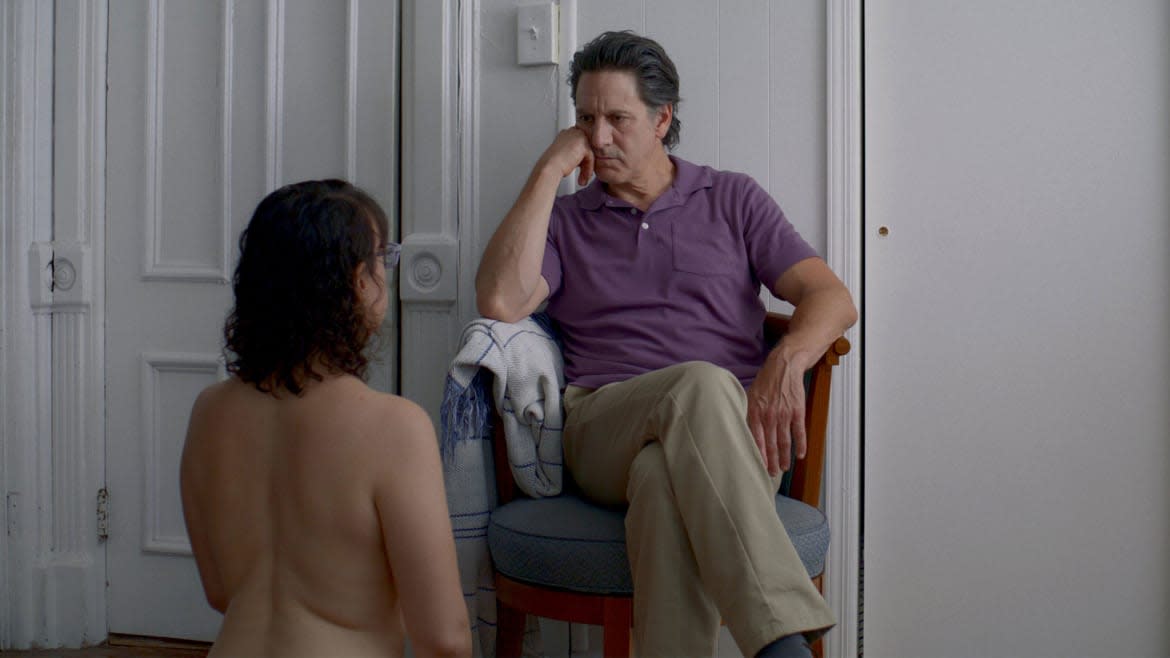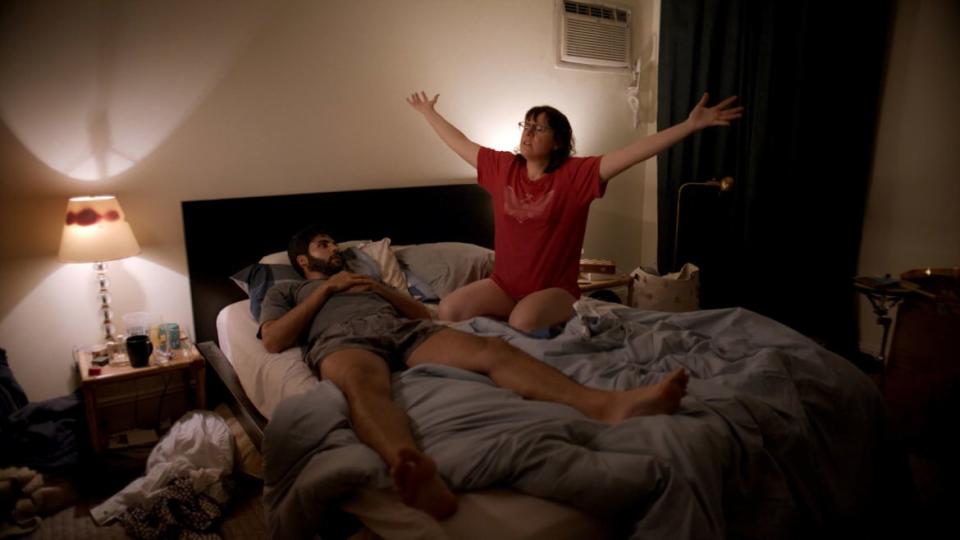‘The Feeling That the Time for Doing Something Has Passed’ Is the Sex Comedy You Need to See

An adult sex comedy that’s also the most amusingly unerotic film of the year, The Feeling That the Time for Doing Something Has Passed, which hits theaters April 26, treads into explicit terrain in order to chart the disaffection and confusion of a thirtysomething Brooklynite in search of direction, fulfillment, and companionship. Written and directed by star Joanna Arnow, this bracingly awkward indie—which played at last year’s Cannes, Toronto, and New York film festivals—is a portrait of millennial estrangement and discontent that, despite suffering from sporadic redundancy, strikes a raw cringe-comedy nerve.
In New York City’s trendiest borough, Ann (Arnow) lies nude in bed beside Allen (Scott Cohen), an older lover whose eyes stay closed as she begins humping his leg. “I love how you never care if I cum. And you don’t do anything for me,” she announces in a monotone come-hither manner. “It’s so disrespectful and misogynist.” When she gets no response, she drops her head to his chest and asks, “Do you think people can change?” Roused to actively engage with this, Allen merely sighs and states, “I don’t know.” This prompts Ann to resume her dry-humping routine and attendant dirty talk, declaring, “I like how you don’t care if I get off because it’s like I don’t even exist.” This may be true about Allen, but he mostly just comes across as exasperated by his partner’s shtick, staring at her and saying, “Can you not?”

Joanna Arnow
Ann tells Allen that he’s the only one she’s seeing but theirs is a decidedly uncommitted relationship, as well as a BDSM one in which she’s the “submissive” and he’s the “master.” During their encounters, Allen has Ann do things like repeatedly suck his nipples and then run to a bedroom wall, or walk over to a dresser, bend over, and spread her cheeks—an act that’s made all the more humiliating by the fact that this positions Ann’s face directly in front of photographs of turn-of-the-20th-century immigrant relatives, whose eyes stare back at her as if asking, “Is this what we struggled for?” Ann, however, is far from a victim in this scenario, since she eagerly seeks such treatment, and her later trysts with other men further reinforce the sense that her sexual proclivities are a means of attaining the power she doesn’t have in any other aspect of her life.
When Ann isn’t spending her evenings doing Allen’s biding, she’s working at a generic office job where her middle-aged boss asserts his finger-on-the-pulse hipness by talking about Spotify and Facebook. Ann is handed an award for her one-year anniversary with the firm—the problem being, she’s actually been employed there for three-and-a-half years. All of this is staged with minimal musical accompaniment and via stationary compositions that highlight the mundanity of Ann’s every waking minute, whether she’s at her computer watching a file slowly copy (complete with her coworker flashing her a cheeky thumbs-up that she returns in kind), or in her kitchen emptying a package of gooey food into a bowl. With curly hair, glasses, and a body that’s she’s not afraid to nonchalantly display to paramours (and audiences), Arnow’s protagonist is the embodiment of early-adult ennui, and her uneasy interactions with others do much to lend the proceedings their understated drollness.

Babak Tafti and Joanna Arnow
Split into chapters titled after the various men whose time (and beds) Ann shares, The Feeling That the Time for Doing Something Has Passed is a weird episodic journey of self-discovery, and it’s punctuated not only by Ann’s dating ups and downs but by her relationship with her mom and dad, who are played by the filmmaker’s real-life parents Barbara Weiserbs and David Arnow (the latter of whom resembles Wilford Brimley). Things are strange and tense in Ann’s clan, and that extends to her rapport with her older sister (Alysia Reiner), who briefly moves into Ann’s Brooklyn apartment, sleeping on an air mattress and wondering about the events that drove her to leave her own family. Everywhere Ann turns, individuals are unhappy and things are off-kilter, and that’s most true in her flings with other BDSM-friendly guys, including Elliot (Parish Bradley), who admits on their first date that he once embarrassed a woman by ejaculating on her cherished law degree, and who has Ann dress up in a pig costume (complete with “fuck pig” scrawled on her stomach) as part of their role playing.
‘The Big Door Prize’ Is the Best Comedy Series You’re Not Watching
The Feeling That the Time for Doing Something Has Passed is, per its title, attuned to the fear that opportunities—for bliss, or at least contentment—are slowly slipping away, and it generates consistent humor from soul-crushing scenarios of professional drudgery and sexually raunchy tedium. Things take a potential turn for the better when, following a series of dates, Ann meets Chris (Babak Tafti) and is surprised to discover that her heart is somewhat aflame. Their dynamic implies that maybe hope remains for Ann to escape her dreary day-to-day, which is peppered with Zoom calls with a new post-merger boss (Only Murders in the Building’s Michael Cyril Creighton) and vacations with her parents that are inert to the point of lifelessness. Nonetheless, Ann’s habit of deriving pleasure from acquiescence proves something of a stumbling block, threatening—as evidenced by subtly dramatized scenes of fooling around—to thwart her attempts to create a truly intimate bond.
Throughout, Arnow proves a revealing and self-effacing actress, unafraid to embody Ann as both a proudly sexual being and a person unsure of who she is, what she wants, where she’s going, what her purpose is, and what other people are thinking. Her writing and direction are similarly assured, marked by clipped sequences and deadpan dialogue that highlight the humdrum absurdity of modern metropolitan singlehood. Around its midway point, The Feeling That the Time for Doing Something Has Passed begins hitting a few redundant notes which suggest that the film barely has 88 minutes’ worth of pointed material. Still, a late recovery and sharp end-credits conclusion make clear that repetition and stasis are the overarching point of this wry NYC indie about the quest for love, joy, and a significant other who’s comfortable being in (and relinquishing) control.
Get the Daily Beast's biggest scoops and scandals delivered right to your inbox. Sign up now.
Stay informed and gain unlimited access to the Daily Beast's unmatched reporting. Subscribe now.

